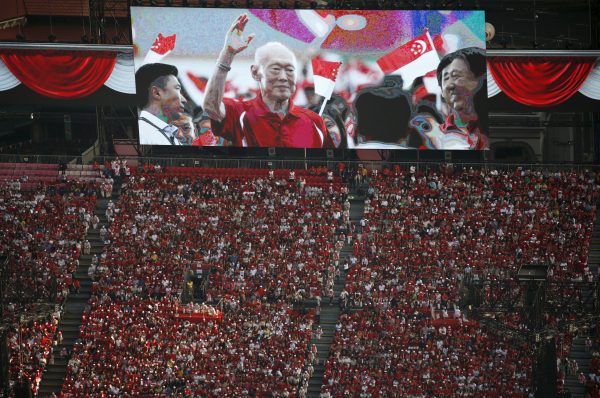Lee began with a warning: ‘There is a point beyond which no Chinese leader can survive if Taiwan is seen to be drifting away under his watch’. Lee, who understood Beijing better than most, knew that this was about allowing for a pretence of progress as much as anything else. Taipei, he advised, had to ‘leave the door open for a future One China’ and keep the show going for everyone’s benefit, along the way maximising the carrots (and minimising the sticks) that Beijing would direct Taiwan’s way. In short, Taipei was not to reveal itself as too unruly to fit into this picture.
As Lee put it, Taiwan should negotiate with Beijing now. Either the PRC would continue to grow in power until it overwhelmed Taiwan’s resistance or it would collapse allowing Taipei to safely ignore whatever concessions it had made. Lee understood that accommodating Beijing’s preferences would be difficult: ‘The last thing any Taiwanese, even of mainlander descent, desires is to be ruled by China’. Still, Lee argues, it is better to enter into unification negotiations willingly to win the best deal possible. Simultaneously, Taipei should ‘influence China’s evolution’ ensuring that ‘they will change to fit into the world’. Otherwise, if unification came via armed takeover, ‘the eventual adjustment, whether in 20 or 50 years, [will be] that much more painful’.
Problematically for Lee, sovereign polities rarely pre-emptively surrender to avoid violence. Today, the population in Taiwan desiring unification is small — only 1.7 per cent want unification now and 8.7 per cent want it in the future.
To be fair, Lee was pessimistic that the strengthening of Taiwan’s separate identity would abate. Lee considered Taiwan’s leaders too obtuse and stubborn to reverse course, though he felt that former Taiwanese president Chen Shui-bian — who had just entered office at the time of Lee’s comments — was more pragmatic.
In Lee’s eyes, Taiwan’s fate would ultimately hinge on US intervention. And it was only a matter of time until the United States disappointed Taiwan. Lee weighed the interests of the United States and China and concluded that Beijing’s investment in Taiwan was greater than Washington’s and that this risked leaving the Taiwanese ‘crushed’.
Yet 19 years after Lee’s predictions, signs point to a growing US commitment to compete with China, defend Taiwan and offset Chinese military advances. The rhetorical support of the Trump administration and Congress and the increasing arms sales from the United States to Taiwan are current examples. Significantly, China’s regional rival Japan has also been cautiously increasing its support for Taiwan, even as it takes steps to reduce friction with China amid divided regional security interests.
Should we be surprised? History shows us that states balance against perceived threats, both by enhancing their defences and reaching out to partners. Why expect Taiwan, the United States and Japan to act differently?
The asymmetry that Lee focusses on — that Taiwan is a greater priority to Beijing than it is to Washington — is also offset by a salient asymmetry. It is less costly for the United States to confront China early with Taiwan’s support than it will be later without.
The same logic determines that China won’t receive decisive support from the rest of the region to tip the balance either. Lee raises the spectre of a ‘humiliated, bitter and xenophobic China’ emerging from a successful US defence of Taiwan. But would regional countries prefer the alternative: a triumphant China with capabilities to occupy Taiwan and chase away the United States?
Whatever the economic realities and Beijing’s touchiness dictate, the only thing worse for the region than a powerful China contained by a US coalition at the Taiwan Strait is one that is not. If forced to really make a choice, the United States, Japan and the wider region would much rather see a PRC invasion of Taiwan fail than succeed.
Looking back, Lee’s writing calls to mind a soon-to-be-retired CEO talking up the market, aware of a ticking bomb buried in the balance sheets. Now, as Warren Buffet famously put it, the tide is out and we can see who has been swimming naked.
Beijing’s threat to use force against Taiwan is credible and growing. And that is precisely why it is self-defeating. The greater the threat, the greater the steps Taipei, Washington and the region will take to resist it.
As Joseph Nye warned, China is containing itself. Attempting unification through the threat of violence is unrealistic and risks catastrophic war. To continue to enable the fantasies of Chinese nationalism and pretend otherwise is the real cruel game.
Joel Atkinson is Associate Professor at Hankuk University of Foreign Studies (HUFS), Seoul.

